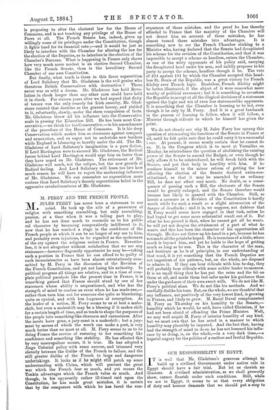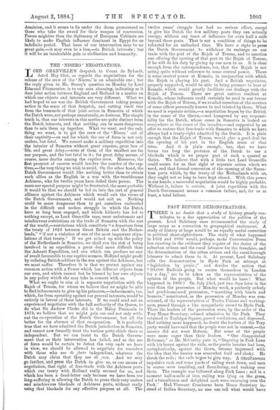OUR RESPONSIBILITY IN EGYPT.
IT is well that Mr. Gladstone's generous attempt to build up a civilised Government under native rule in Egypt should have a fair trial. But let us cherish no illusions. A civilised administration, as we shall presently show, cannot flourish under such conditions. Still, while we are in Egypt, it seems to us that every obligation of duty and honour demands that we should pat a stop to horrors which, though the natural fruit of the Mussulman system, are at least not sanctioned by the letter of the Sacred Law. The British public bare been shocked by a horrid account in last Tuesday's Thnes of the infliction of the bastinado on three wretched Arabs. These are, in fact, ordinary incidents of Mussulman rule. But, so long as we hold Egypt in our grasp, such things ought not to be. It is vain to throw the responsibility on the inherent vices of native administration. Europe will hold us, and justly hold us, responsible for the administration of Egypt while we occupy the country ; and all attempts to shift the responsibility will be considered, however unjustly, as proving our indiffe- rence, in spite of our professions, to the well-being of the population. And this is a reproach which Mr. Gladstone's Government in particular cannot afford to incur. It came into office mainly as the champion of oppressed nationalities, as the vindicator of the righteous claim of Mussulman and Christian alike to be delivered from the rapacity and cruelty of Pashas, and Mudirs, and Bimbashis ; and it will seem in- tolerable even to ardent Liberals that these gentry should be allowed to continue their evil practices under the shelter of British power. We understand the difficulties of the Government. They wish to evacuate Egypt at the earliest opportunity, and they fear that if they take direct con- trol of the administration of the country they will find it much more difficult to retire eventually. We believe, on the contrary, that a firm hand now will make the policy of evacuation more easy hereafter. What is needed in Cairo at present is an English official of first-class rank and strong will —like Lord Dufferin—against whom native Pashas and foreign intriguers would feel themselves comparatively power-
less. Our future ii.fluence for good in Egypt, not less than our good name before the world, is at stake in this matter. Hitherto we have given the toiling people of Egypt no special cause of gratitude for our intervention. Let us take care that when our Army leaves Egypt the Fellaheen may have cause to remember its sojourn there with gratitude. The vigour with which Lord William Bentinck struck down oppression and iniquity in Sicily is still remembered gratefully in that island, as the present writer can personally testify. It is intolerable that such horrors as Mr. Clifford Lloyd and M. Hilaire Gay have disclosed should be allowed to go on under the protection of British bayonets. Let at least the rudimentary safeguards of justice be furnished to the wretched Fellaheen while our troops are masters of the country. And who can tell whether some years' experience of British justice might not fire even the patient Egyptian with a determination to break the fetters of a system through which he has suffered so much and so long ? In some consummation like that lies the only chance of success for the experiment which Mr. Gladstone's Govern- ment is making in Egypt. European civilisation cannot, be grafted on a Mussulman stock. Mohamedanism has been in the world for twelve centuries, and its capacity for civilisation has been tested among every variety of people and in every variety of circumstances ; and the re- sult has been everywhere the same. Civilised government, as we understand it, has always been found incompatible with Mussulman rule. And the reason is plain. There are four cardinal doctrines which are of the essence of Islam, and which bar for ever the path of progress and civilisation. These are the eternal inferiority of the non-Mussulman to the Mussulman in civil and religious life ; the institution of polygamy and concubinage, with practically unlimited divorce ; the slavery of non-Mussulmans ; and prohibition of
free inquiry. These doctrines are of the essence of the Mussulman system, and have always been inseparable from it. And the Mussulman system is incapable of reforma- tion. In this respect it is an exception to every religious system the world has ever seen. Even the Papal system, as defined by the Vatican decrees, does not absolutely preclude reformation. There are loopholes by means of which the infallible voice may modify the system, since the voice is a living one, and may be appealed to in an emergency. But Islam has only one infallible Pope, and he has been dead for centuries. Mohamed left no offitial successor, nor can he have any. What it seemed to him good, therefore, to decree in faith and morals and civil government, must remain for ever the law of the Mussulman world. It can never be changed in any particular, for it is believed to be the last and final expression of the divine will to man. Whatever doctrines of faith and rules of life are laid down in the Koran and Tradi- tions must remain unchangeably the boundary beyond which no
honest Mussulman can ever pass. Let us see how this works in practice. It is a fundamental tenet of Islam that none but Mussulmans can ever be citizens of a Mussulman State. That is a tenet which can never be abrogated, for it is part of the Sacred Law. And it never has been abrogated in any Mussul- man State wielding independent sway. Mussulman rulers have often employed Christians and other unbelievers in the service of the State,—sometimes in positions of great trust- and dignity. But no Mussulman ruler ever gave or ever could give the rights of citizenship to a non-Mussulman. To give one example out of many : the meanest Mussulman possesses inalienably the legal right to insist on the rejection of Christian evidence against him. Equality of civil and religious rights can never subsist between the unbeliever and the Mussulman. It is evident therefore that civilised Government, in the ordinary sense of the term, can never exist in any Mussulman State where there is a population of non-Mussulmans. This is the explanation of the " Capitulations " which Christian Governments have extorted from the Porte, and by means of which the citizens of foreign States are exempted from the jurisdiction of the native tribunals. But there are no Capitu- lations to protect the Christian subjects of the Mussulman State. They are subjects of the Mussulman ruler, but never citizens of the State. They are bonnd to render any service required of them ; but this obligation implies no correlative rights.
But granting that civilised government is impossible in a Mussulman State of which the population is mixed, is it im- possible also in a State of which the population (not counting• the slaves) is enthely Mussulman? Here, of course, the barrier of the eternal non-equality of rights is removed. The subjects of the State are all in possession of the full rights of citizens. But unfortunately those rights themselves are, both by their limitations and their licence, inimical to civilisa- tion. The right to possess slaves, to divorce wives practi- cally ad libitum, to have any number of concubines, to reject non-Mussulman evidence against a Mohamedan,— rights like these, when freely exercised, are certain to sap the foundation of morals ; and it is impossible that a righteous and civilised system of administration can thrive under any Government of which they are neces- sarily an integral part. What demonstrated the incurability of the nations of Canaan was that they did their abominations "unto their gods." Their vices were woven into the woof and texture of their religion, and by that religion their char- acter was moulded into a shape which defied all efforts at amendment. We see the same phenomenon in the Mohamedan system. The iniquities of Mussulman rule are an essential part of the system. The deity whom the Moslem adores is a being who is partial, unjust., cruel, impure ; and as the god is, so is the worshiper. Amari, a critic who is as friendly to . Islam as the inexorable logic of facts will admit, declares that Mussulman rule is necessarily "born with the germ of prema- ture death ;" and a still friendlier critic, Mr. Gifford Palgrave, has stated, as the result of his extensive study and experience, that "when the Koran and Mecca shall have disappeared. from Arabia, then, and then only, can we expect to see the Arab assume that place in the ranks of civilisation from which Mohamed and his book have, more than any other cause, long held him back." There is absolutely no hope for the civilisation of any people living under independent Mussulman rule. The verdict of history is conclusive on that point. Moorish Spain, Bagdad, Hindustan under the Moguls, are no exceptions to the general rule, as could easily be shown if this were the place in which to do it. We cannot help rejoicing, therefore, when any territory has been rescued from the withering curse of Mussulman domination, however much we may dislike the means. No honest politician can approve of the chicanery by which France annexed Tunis, or the intrigues practised by her agents in Morocco. But who can doubt, on the other hand, that Tunis has gained immensely, and.that Morocco would equally gain, by the sub- stitution of French for Mussulman rule ? Who can doubt, too, that Egypt would soon become prosperous and happy under the direct rule of England ? So much do we feel this that we are not unwilling even to run some risk for the sake of so great a boon to a long•suffering people. And, indeed, the finger of Providence seems to point to that consummation as the final solution of the Egyptian problem. Is there not a mysterious providence in the series of unexpected obstacles that have crossed our path. each time we have begun to evacuate Egypt ? All over the world the forces of Christian civilisation are closing in upon Islam. By the sword it acqtured its
dominion, and it seems to lie under the doom pronounced on those who take the sword for their weapon of conversion. Forces mightier than the diplomacy of European Cabinets are likely to make English influence dominant in Egypt for an indefinite period. That issue of our intervention may he no great gain,—it may even be a loss,—to British interests ; but it will be an incalculable gain to civilisation and humanity.




































 Previous page
Previous page